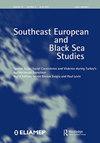The reproduction of fear in populist discourse: an analysis of campaign speeches by the Justice and Development Party elites
IF 0.8
2区 社会学
Q2 AREA STUDIES
引用次数: 0
Abstract
ABSTRACTThis paper scrutinizes the reproduction of fear in the populist discourse of the Justice and Development Party and provides a content analysis of campaign speeches between 2015 and 2018. We posit that the linkage between populism and fear derives from two frames, victimization and blaming, appealing to perceived threat and insecurity that deepens the construction of ‘us-vs-them’ group differentiation. We argue that the AKP’s campaign in the 2015 elections frames security, value, and competing narratives by emphasizing terrorism, clashes with the ‘others’, and the opposition’s lack of capacity to rule. Their campaign in the 2017 referendum articulates a crisis and issue-based narrative over the coup attempt and constitutional amendments, and the 2018 campaign featured an issue, value, and security-based narrative. The findings show various continuities and changes in the AKP narratives based on exploiting citizens’ threat perceptions, with broad fear-based narratives remaining constant while the specifics of the threat adapt to the political atmosphere of the time.KEYWORDS: Populismfearemotionselectionselectoral campaignsAKP Disclosure statementNo potential conflict of interest was reported by the author(s).Notes1. After the coup attempt, the government initiated numerous institutional changes in different spheres. Moreover, the official names of the Bosphorus Bridge, bus terminal, parks, and bus stops were changed to commemorate 15 July. Reforms on the military, Turkish Armed Forces, military schools, curricula, and institutions have been instituted. New decree laws were induced to dismiss civil servants, launch cases, close institutions such as universities, trade unions, newspapers, associations, television channels, schools, and so on, and trustees were appointed to typically elected municipal offices.2. This, however, also resulted in a split from the MHP, as those who largely opposed aligning with the AKP formed the oppositional İYİ Party (Good Party).3. For details, see Popping (Citation2018).4. Please also see Rooduijn and Pauwels (Citation2011).5. You can find the complete list of speeches in the Appendix, along with its location and details.Additional informationNotes on contributorsTuğçe ErçetinTuğçe Erçetin is an Assistant Professor at Istanbul Bilgi University of International Relations Department. She holds master’s degrees in Political Science and International Relations from the University of Essex and Istanbul Bilgi University; also she has a doctoral degree in Political Science from Istanbul Bilgi University. She has been a researcher in different projects on othering, populism, polarization, refugees and social entrepreneurship, civil society and volunteerism.Emre ErdoğanEmre Erdoğan is Professor at Istanbul Bilgi University of International Relations Department. With a doctoral degree in Political Science from Boğaziçi University, he has served as researcher and senior consultant in various projects in academia and civil society. His research focuses on political participation, foreign policy and public opinion, child and youth well-being, methodology and statistics. He extensively studies and publishes about youth in Turkey, integration of Syrian refugee youth in Turkey, othering, polarization and populism.民粹主义话语中恐惧的再现:对正义与发展党精英竞选演讲的分析
摘要本文考察了正义与发展党民粹主义话语中恐惧的再现,并对2015年至2018年的竞选演讲进行了内容分析。我们认为,民粹主义和恐惧之间的联系源于两个框架,受害和指责,吸引了感知到的威胁和不安全感,加深了“我们对他们”群体分化的构建。我们认为,正义与发展党在2015年选举中的竞选活动通过强调恐怖主义、与“他者”的冲突以及反对派缺乏统治能力来构建安全、价值和竞争叙事。他们在2017年公投中的竞选活动对政变企图和宪法修正案进行了危机和基于问题的叙述,2018年的竞选活动则以问题、价值和安全为基础。研究结果显示,正义与发展党在利用公民对威胁的看法的基础上,叙述具有各种连续性和变化,广泛的基于恐惧的叙述保持不变,而威胁的细节则适应当时的政治氛围。关键词:民粹主义、恐惧情绪、选择、选举活动、公开声明作者未发现潜在的利益冲突。政变未遂后,政府在不同领域发起了许多制度变革。此外,为了纪念7月15日,博斯普鲁斯大桥、巴士总站、公园和巴士站的官方名称也被更改。对军队、土耳其武装部队、军事学校、课程和机构进行了改革。新的法令法被诱使解雇公务员,发起诉讼,关闭大学、工会、报纸、协会、电视频道、学校等机构,而受托人则被任命为通常由选举产生的市政官员。然而,这也导致民族行动党分裂,因为那些主要反对与正义与发展党结盟的人组成了反对党İYİ党(好党)。详情请参见弹出(Citation2018)。请参见Rooduijn and Pauwels (Citation2011)。你可以在附录中找到完整的演讲清单,以及演讲地点和细节。关于contributorsTuğçe ErçetinTuğçe的说明eraperetin是伊斯坦布尔比尔吉大学国际关系系的助理教授。她拥有埃塞克斯大学和伊斯坦布尔比尔吉大学政治学和国际关系硕士学位;她还拥有伊斯坦布尔比尔吉大学政治学博士学位。她的研究领域包括他者、民粹主义、两极分化、难民和社会创业、公民社会和志愿服务。埃姆雷ErdoğanEmre Erdoğan,伊斯坦布尔比尔吉大学国际关系系教授。他拥有Boğaziçi大学政治学博士学位,曾在学术界和民间社会的各种项目中担任研究员和高级顾问。他的研究重点是政治参与、外交政策和公众舆论、儿童和青年福祉、方法论和统计。他广泛研究并发表了有关土耳其青年、叙利亚难民青年在土耳其的融合、其他问题、两极分化和民粹主义的文章。
本文章由计算机程序翻译,如有差异,请以英文原文为准。
求助全文
约1分钟内获得全文
求助全文
来源期刊

Southeast European and Black Sea Studies
AREA STUDIES-
CiteScore
3.00
自引率
19.00%
发文量
73
期刊介绍:
The aim of the journal is to establish a line of communication with these regions of Europe. Previously isolated from the European mainstream, the Balkan and Black Sea regions are in need of serious comparative study as are the individual countries, no longer "at the edge" of Europe. The principal disciplines covered by the journal are politics, political economy, international relations and modern history; other disciplinary approaches are accepted as appropriate. The journal will take both an academic and also a more practical policy-oriented approach and hopes to compensate for the serious information deficit on the countries under consideration.
 求助内容:
求助内容: 应助结果提醒方式:
应助结果提醒方式:


